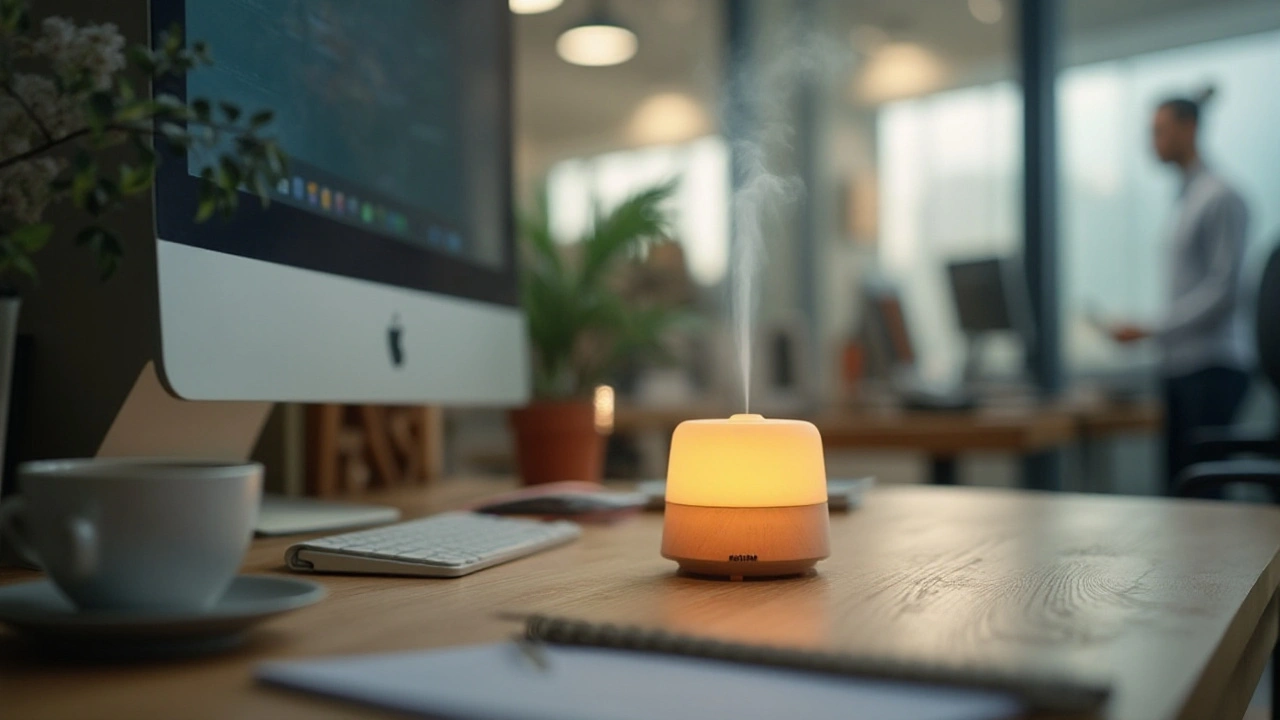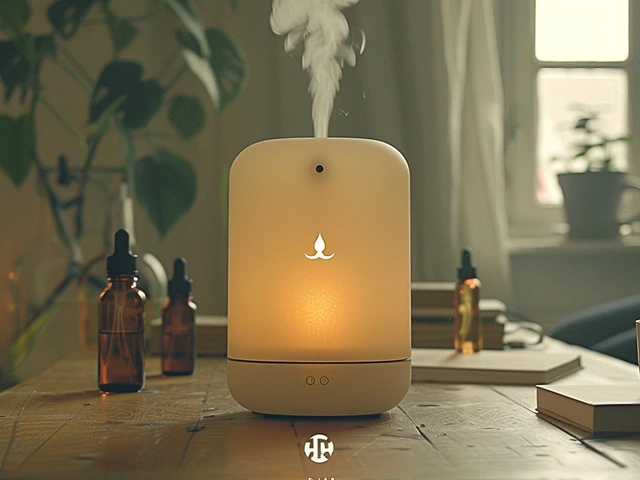Imagine walking into your office and being greeted with the invigorating scent of peppermint or the calming aroma of lavender. Aromatherapy isn't just confined to spas and wellness retreats but has made its way into the modern workplace as a tool to boost productivity and enhance overall well-being.
Aromatherapy uses natural plant extracts and essential oils to promote physical and psychological well-being. By integrating these scents into the work environment, employees can experience reduced stress, improved focus, and a more positive atmosphere. This article will guide you through understanding the basics of aromatherapy, exploring its benefits in the workplace, and providing practical tips for incorporating it into your daily office life.
- Understanding Aromatherapy
- Benefits of Aromatherapy in the Workplace
- Practical Ways to Implement Aromatherapy
- Essential Oils to Enhance Workplace Productivity
Understanding Aromatherapy
Aromatherapy is more than just pleasant smells; it is a holistic healing treatment that uses natural plant extracts to promote health and well-being. The practice dates back thousands of years to ancient civilizations like the Egyptians, Greeks, and Chinese, who utilized aromatic plant extracts for religious rituals, medicinal purposes, and cosmetics.
In modern times, aromatherapy focuses on essential oils derived from various parts of plants, including flowers, leaves, bark, and roots. These essential oils are highly concentrated and have distinct properties and benefits. For example, lavender oil is famous for its calming and relaxing effects, while peppermint oil can invigorate and enhance mental clarity.
Scientific studies have shown that certain scents can positively impact mood, cognitive performance, and even physical health. A 2017 study published in the International Journal of Neuroscience found that participants who inhaled lavender essential oil experienced reduced mental stress and anxiety, proving the effectiveness of aromatherapy in promoting mental well-being. Another study highlighted in the Journal of Alternative and Complementary Medicine revealed that rosemary oil improved cognitive performance and memory in office workers.
"Aromatherapy has a unique ability to directly impact the brain's limbic system, which is involved in emotions, behaviors, and long-term memory," explains Dr. Nicole Bielderman, a researcher in alternative medicine.
The limbic system connects scents to human emotions and can trigger the release of chemicals in the brain, such as serotonin and endorphins, which can create feelings of happiness, relaxation, or alertness. This unique connection is one reason why aromatherapy is effective in the workplace. By using certain scents, we can potentially influence our emotional states and mental functions, leading to improved productivity and reduced stress.
Aromatherapy can be administered in several ways, making it easy to integrate into a workplace environment. The most common methods include inhalation, where essential oils are diffused into the air, and topical application, where oils are diluted and applied to the skin. Diffusers, spray bottles, and roll-on applicators are some tools used to deliver the benefits of aromatherapy.
Understanding the fundamental principles of aromatherapy and how it interacts with our bodies is crucial before infusing it into the workplace. It's not just about filling the air with pleasing aromas but about choosing the right essential oils that align with the desired outcomes. Whether it's reducing stress, improving focus, or boosting morale, aromatherapy has the potential to transform the workplace into a healthier, more productive environment.

Benefits of Aromatherapy in the Workplace
Enhancing workplace productivity doesn't always mean crunching numbers or re-evaluating strategies; sometimes, it can be as simple as improving the atmosphere with the right scents. Studies have shown that aromatherapy can play a pivotal role in enhancing mental clarity and reducing stress among employees. Imagine your workday peppered with uplifting scents that boost your mood and keep you focused.
Aromatherapy has been found to stimulate certain brain functions. For instance, peppermint oil, known for its refreshing and invigorating scent, can enhance mental clarity and energy levels. A study published by the International Journal of Neuroscience demonstrated peppermint's ability to improve cognitive performance and increases alertness. This can be especially beneficial during the midday slump, providing a natural pick-me-up.
Reducing stress is another crucial benefit of incorporating aromatherapy in the workplace. The calming scent of lavender is often used to combat anxiety and promote relaxation. According to a study in the Journal of Advanced Nursing, patients who inhaled lavender oil reported a significant decrease in stress levels and anxiety. Think of the impact a less stressed workforce could have on productivity—a calmer atmosphere can prevent burnout and reduce absenteeism, making employees more present and engaged.
In addition, certain scents can act as morale boosters. Citrus oils, such as lemon and orange, are known for their uplifting properties. A splash of these scents can infuse the office with positivity. Higher morale leads to a more collaborative and motivated team. An enjoyable work environment can cultivate a sense of belonging and boost overall job satisfaction.
"The power of scent triggers positive associations and emotions, making aromatherapy an effective tool for workplace wellness," says Dr. Jane Buckle, a clinical aromatherapist with extensive research in the field.
Moreover, aromatherapy can aid in creating a more pleasant physical environment. Many offices suffer from stuffy air or unpleasant odors. Introducing natural scents can greatly improve the ambiance, making the workplace more inviting. Employees are likely to feel more comfortable and motivated, which can directly impact their productivity.
Improved focus is another key benefit. Rosemary oil, for example, has been linked to better memory retention and concentration. According to a study published in the Therapeutic Advances in Psychopharmacology, exposure to rosemary essential oil improved both speed and accuracy on cognitive tasks. This could be a game-changer during critical work meetings or periods requiring intense concentration.
Lastly, aromatherapy can also play a role in boosting immunity, which is crucial in a shared office environment. Essential oils such as eucalyptus and tea tree have antiviral and antibacterial properties. Introducing these scents can potentially reduce the spread of germs, creating a healthier workplace and decreasing sick days.

Practical Ways to Implement Aromatherapy
Implementing aromatherapy in the workplace can be a delightful and straightforward process. One of the easiest methods is using an essential oil diffuser. These devices disperse tiny oil particles into the air, filling the office with therapeutic scents. To get started, place a diffuser on your desk or in a common area and add a few drops of essential oil. It's best to begin with lavender or peppermint, known for their calming and invigorating properties, respectively. Don’t forget to follow the manufacturer’s instructions to avoid overloading the space with too strong a fragrance.
Another practical option is using aromatherapy sprays. These can be a lifesaver for quick scent refreshes. Simply mix a few drops of your chosen essential oil with water in a spray bottle, shake well, and mist it around your workspace. This method is particularly useful for shared offices where installing multiple diffusers might not be feasible. Not only does this freshen up the air, but it also provides an instant mood lift.
You can also use essential oil rollerballs for a more personal approach. These portable options allow you to apply your favorite oils directly onto your skin, such as your wrists or temples. The scent travels with you throughout the day, providing a consistent therapeutic effect. Additionally, you might consider aromatherapy jewelry, like diffuser necklaces or bracelets, where you can add a drop of essential oil to the jewelry, letting the aroma infuse your senses all day long.
Introducing aromatherapy into team meetings is another great way to enhance collective productivity. Before a meeting starts, light an essential oil candle or use a battery-operated diffuser to spread a balanced aroma. Citrus oils, like lemon or orange, can help boost alertness and positive energy, making for more dynamic and productive discussions. Be sure to choose scents that everyone finds agreeable to avoid discomfort.
Incorporating Aromatherapy into Office Decor
An innovative way to integrate aromatherapy into the office environment is through indoor plants. Plants like eucalyptus, rosemary, and lavender not only improve air quality but also release subtle, pleasant aromas. Position these plants strategically around the office, especially in areas where relaxation or increased focus is needed. Regularly tending to these plants can also provide a calming break from work, offering additional mental health benefits.
For a more sustained approach, consider using essential oil-infused office supplies. Items like scented pens, notebooks with infused pages, or mouse pads can constantly emit a gentle aroma, keeping you in the right frame of mind. These small touches can significantly enhance your daily work experience without being overpowering.
| Essential Oil | Effect |
|---|---|
| Peppermint | Boosts energy and focus |
| Lavender | Reduces stress and promotes calmness |
| Lemon | Enhances mood and concentration |
| Rosemary | Improves memory and alertness |
"The sense of smell is a powerful tool in creating and enhancing a productive environment. Aromatherapy can transform the workplace atmosphere and improve overall productivity." - Dr. Jane Buckle, Author of Clinical Aromatherapy

Essential Oils to Enhance Workplace Productivity
Incorporating aromatherapy into your workspace is more than just a trend; it's a scientifically-backed method to boost productivity and enhance mental well-being. Let's delve into specific essential oils that can help create a more vibrant and focused work environment.
Peppermint Oil
Peppermint oil is a powerhouse when it comes to boosting alertness and concentration. The invigorating scent of peppermint can stimulate the mind, making it easier to stay focused and clear-headed during demanding tasks. Studies have shown that peppermint oil can improve cognitive performance and decrease mental fatigue. Placing a few drops in a diffuser can create an atmosphere that supports mental clarity and sustained focus.
Lavender Oil
If you're dealing with a high-stress project or a tight deadline, lavender oil can be your go-to essential oil. Known for its calming and soothing properties, lavender helps reduce stress and anxiety, promoting a sense of calm and relaxation. This peaceful state can help employees remain composed and productive, even in the most hectic work situations. The tranquil aroma of lavender can also enhance sleep quality, ensuring you're well-rested and ready to tackle the day's challenges.
Lemon Oil
The fresh and zesty scent of lemon oil is a great way to uplift mood and enhance positivity in the workplace. Lemon oil is known for its antidepressant qualities and can create an environment that feels both energetic and welcoming. The crisp aroma helps to sharpen mental faculties and improve attention span, fostering a more efficient workday. Adding lemon oil to a diffuser or spray can spread its refreshing scent around the office.
Rosemary Oil
Rosemary oil is well-regarded for its ability to enhance memory and cognitive function. This essential oil is particularly effective in environments where mental stamina and sharpness are required. Rosemary's stimulating scent helps keep the brain alert and focused, making it an excellent choice for meetings, brainstorming sessions, or any task that demands high cognitive engagement. Regular diffusion of rosemary oil can contribute to an atmosphere of heightened intellectual activity.
"The sense of smell is one of our most powerful senses; it can instantly change our mood or transport us back in time." - Dr. Alan Hirsch, Neurologist and Psychiatrist
Eucalyptus Oil
Eucalyptus oil offers a refreshing, invigorating scent that can significantly enhance respiratory function and mental clarity. Its ability to clear the mind and relieve mental exhaustion makes it a valuable addition to any workspace. Eucalyptus oil is also known for its antibacterial properties, contributing to a healthier work environment. Integrating eucalyptus oil into your aromatherapy routine can help keep the office air clean and your focus sharp.
By using these natural scents, you not only enrich your workspace but also promote a healthier, more productive atmosphere. Aromatherapy can be integrated into daily routines through diffusers, sprays, or personal inhalers, making it a flexible and accessible option for everyone. Whether you aim to sharpen focus, calm your mind, or boost energy levels, there's an essential oil to meet your needs, paving the way for a more productive and enjoyable workday.






